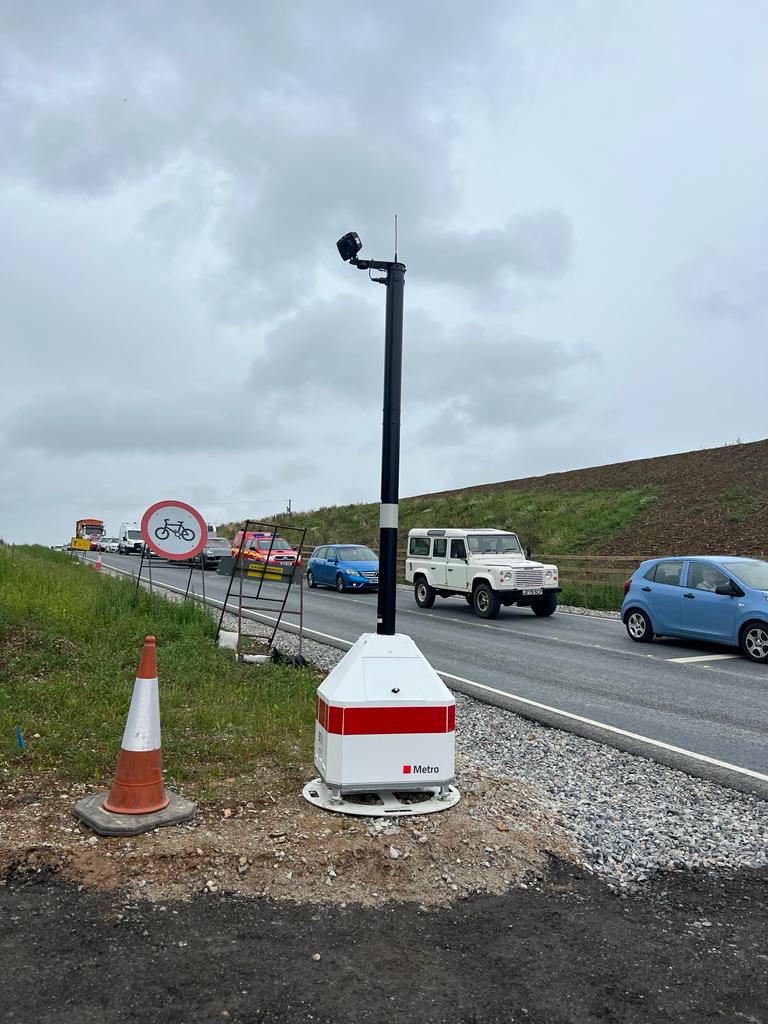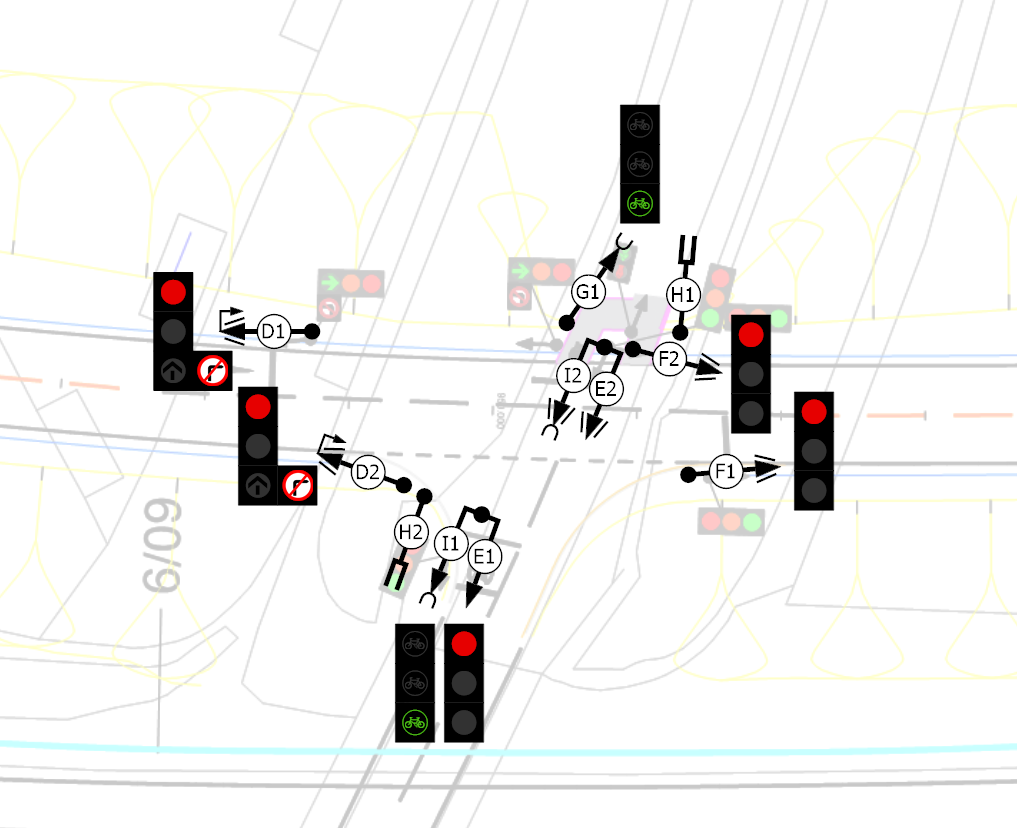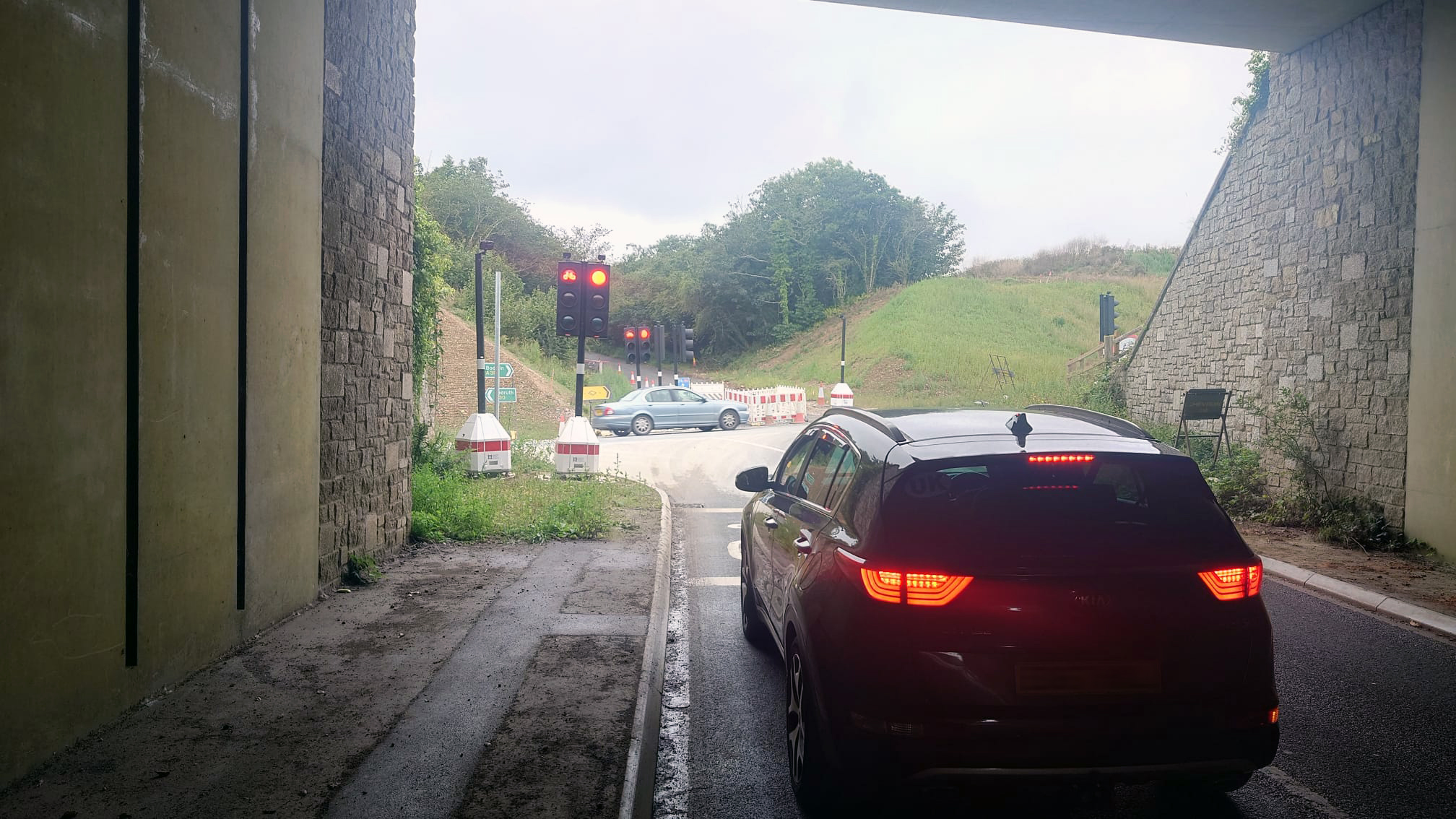Using AI to enhance cyclist safety and improve traffic flow in Zelah, Cornwall
The A30 dual carriageway bypass project in Zelah, Cornwall, undertaken for National Highways in collaboration with Chevron Traffic Management, embarked on a mission to enhance traffic flow and safety along a pivotal transport corridor connecting Devon and Cornwall.
Amidst the project’s ambitious goals, a significant challenge emerged: providing cyclists with safe and efficient facilities while ensuring compliance with stringent design standards for cycle infrastructure.
The innovative deployment of the AGD650 AI detection system in conjunction with Traffic Group Signals Metro temporary signals illuminates the journey towards improved cyclist safety and adherence to national cycling design standards.

Challenges
Among the project’s primary objectives was the provision of safe and efficient facilities for cyclists traversing a national cycle route. This necessitated meticulous planning and implementation to accommodate cyclists amidst the construction of the dual carriageway bypass.
Local traffic management also emerged as a paramount concern during the project’s execution, with a keen focus on minimising disruptions to the surrounding areas. The high traffic volumes along the A30, averaging approximately 22,000 vehicles per day, presented a formidable challenge in maintaining smooth traffic flow while ensuring the safety of road users, including cyclists.
Furthermore, the project mandated sophisticated detection systems capable of operating autonomously, devoid of traditional power sources. This off-grid operation demanded innovative solutions to ensure seamless functionality and reliability of the detection systems, even in remote locations along the bypass.
Adherence to stringent design standards for cycle infrastructure, as outlined in the Design Standards for Cycle Infrastructure LTM 1/20, was imperative to ensure the project’s alignment with national cycling guidelines. This required fastidious attention to detail in the planning and execution phases to meet the prescribed standards and enhance cyclist safety.
The diverse range of vehicles journeying the A30, including heavy goods vehicles and agricultural machinery, added complexity to ensuring cyclist safety amidst varying traffic dynamics. Stringent planning and implementation of safety measures were paramount to mitigate risks and safeguard cyclists navigating the bypass.
Moreover, the high-speed nature of the A30 presented additional challenges for cyclists, requiring a secure means of crossing the road, particularly in light of vehicles exceeding the 40mph speed limit. Ensuring the safety and efficiency of cyclist crossings demanded innovative solutions to address the dynamic nature of the high-speed road environment.
In response to these multifaceted challenges, the deployment of the AGD650 AI detection system emerged as a pivotal solution to enhance cyclist safety and traffic flow on the A30 bypass. Leveraging its advanced capabilities, including accurate cyclist detection and seamless integration, the AGD650 system proved instrumental in addressing the project’s objectives.
By providing precise cyclist detection and optimising signalling efficiency, the AGD650 enabled National Highways to adhere to national cycling design standards, even in temporary works environments. Activating the cycle-specific stage an average of 12 times daily underscored the system’s efficacy in enhancing cyclist safety and minimising disruptions to other road users.
Solution
The deployment of the AGD650 AI detection system proved to be a cornerstone in effectively addressing the complex challenges encountered during this project. Chosen for its remarkable ability to detect cyclists with precision, particularly at advanced stop lines (ASL), the AGD650 emerged as an essential solution to enhance cyclist safety and optimise traffic flow along the bypass.
The abundance of benefits showcased by the AGD650 AI detector revolutionised the project’s dynamics and outcomes. Particularly advantageous was the elimination of false triggers or nudges, a common pitfall associated with traditional detection systems. By averting unnecessary disruptions to traffic flow, the AGD650 ensured seamless navigation for all road users, enhancing overall operational efficiency.
A standout feature of the AGD650 system was its provision of early starts for cyclists, granting them a head start before vehicular traffic. This proactive approach not only prioritised cyclist safety but also facilitated smoother traffic flow at intersections, reducing the likelihood of congestion and potential accidents.
The AGD650 system’s accurate cyclist detection capabilities significantly enhanced safety for cyclists and other road users alike. By providing real-time data and insights, the system enabled proactive measures to mitigate risks and ensure a safer road environment for all. In addition to enhancing safety, the AGD650 system improved signalling efficiency by activating the cyclist stage only when necessary. This optimised resource utilisation not only reduced unnecessary delays but also contributed to streamlined traffic management along the bypass.
Furthermore, the AGD650 system’s easy integration and high-speed detection capabilities were key to the project’s success. Its seamless installation process limited disruptions and downtime, ensuring continuous operation throughout the project’s lifecycle. Additionally, the system provided reliable data for traffic management endeavours, enabling informed decision-making and proactive interventions as needed.
“In pioneering the application of artificial intelligence at roadworks, we’ve uncovered invaluable insights into the potential of our technology,”
Jason Swan, Technical Manager at Traffic Group Signals.
“Through this innovative approach, we’ve not only enhanced the safety of vulnerable road users but also optimised efficiency across our sites. This shift in utilising AI on the strategic road network signifies a major advancement in our understanding of how technology can shape a safer and more effective transportation infrastructure .”
Sophisticated in Design
The scheme was designed by Signal Studio, a proprietary piece of software. Signal Studio allowed our professional services team to overlay our signals on the traffic management plan and explore a range of timing and phasing options to maximise the efficiency of the site.
Through the use of the software, our professional services team was able to define which phases were run demand dependently, schedule different timing plans throughout the day and remotely manage the signal timings, avoiding travelling to the remote location to update the configuration. The ability to run stage-based signalling meant the TGS team was able to create a sophisticated set of rules with which to apply timings to the roadside hardware.

Results
The deployment of the AGD650 AI detection system yielded remarkable results, firmly establishing its efficacy in overcoming the project’s challenges with resolute precision and reliability. Notably, the cycle-specific stage was activated an average of 12 times daily, underscoring National Highways’ unwavering commitment to upholding national cycling design standards, even within the dynamic constraints of temporary works environments.
Through its unparalleled accuracy and reliability, the AGD650 system ensured the seamless navigation of junctions for cyclists, fostering a safe and efficient passage amidst vehicular traffic. This pivotal achievement not only safeguarded the well-being of cyclists but also minimised disruptions to other road users, thus reinforcing the project’s overarching goal of enhancing safety and operational efficiency along the A30 bypass in Zelah, Cornwall.
The results clearly demonstrate the indispensable role of advanced traffic detection systems in realising safety and efficiency objectives in complex infrastructure projects. By leveraging cutting-edge technologies such as the AGD650 AI detection system, stakeholders can navigate the intricate challenges of modern transportation networks with confidence and precision, paving the way for a safer and more sustainable future.
“In pioneering the application of artificial intelligence at roadworks, we’ve uncovered invaluable insights into the potential of our technology,”
Jason Swan, Technical Manager at Traffic Group Signals.
Enquire Now
